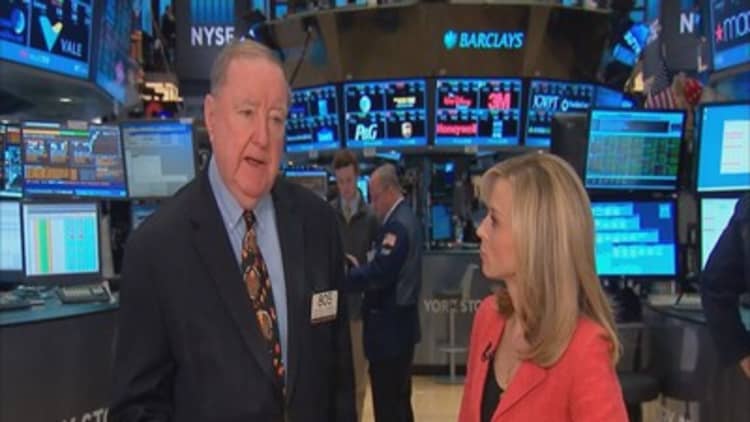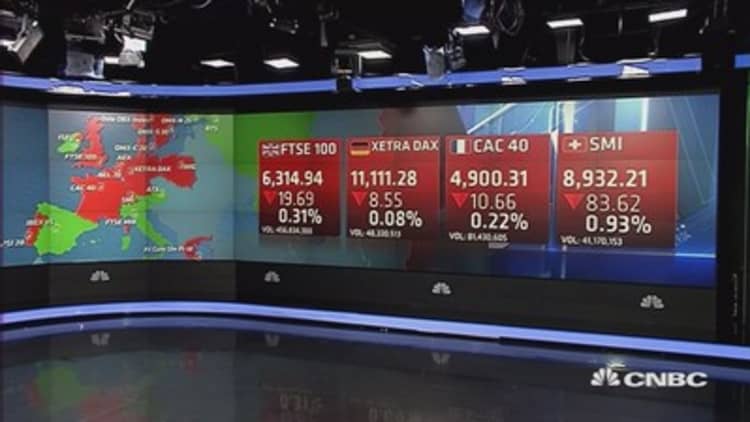


Comments from Saudi Arabian officials stirred speculation OPEC could be considering abandoning its market-based pricing strategy, but the cartel is unlikely to change policy and it heads into next week's meeting less relevant than ever.
Oil surged Monday on remarks from Saudi officials that the country is willing to work with oil producing and exporting countries, both inside and outside of OPEC to maintain market and price stability. West Texas Intermediate crude futures shot higher after the comments but then fell back and fluctuated.
"It's really just short covering. The Saudi comments are a reminder to the market that the Saudis aren't powerless, but OPEC is overall for sure. At some point, the sell-off will be vulnerable to a production response. The fact of the matter is if they really do cut production by a million or 2 million barrels, the market would react to that. I don't think they're ready to do that yet," said oil analyst John Kilduff of Again Capital.
The comments echo others made by Saudi officials. But they did come a day after Venezuela's oil minister said OPEC cannot allow a price war and must act to stabilize prices. He said oil could go as low as the "mid-$20s."
Read MoreHere's the comments that sent oil higher
The Organization of the Petroleum Exporting Countries just a year ago moved to a policy of allowing the market to set prices for the first time, instead of trying to stabilize them with a production response. Saudi Arabia, then the world's swing producer, said it would not cut production unless others producers joined in, particularly the high-cost producers. That would include U.S. shale drillers.
OPEC meets again on Dec. 4. "They're not going to do anything. They're going to sit pat," said Edward Morse, head of global commodities research at Citigroup.
Morse said he expects OPEC members like Venezuela will be pleading with the Saudis to cut production. "I don't think Saudi Arabia or any of the Gulf Cooperation Council yet are in a position to say our strategy doesn't work," he said. "I've written that OPEC is dead frequently enough that I have to believe it," said Morse. "It's unlikely they're going to get a joint decision anytime soon involving a production cut that includes Iraq, Iran and Venezuela, let alone Libya."
Iran's oil minister, Bijan Zanganeh, said Monday he doubted OPEC has the will to act as a group to support oil prices. When asked about the Saudi comments, the minister said, "I don't believe there is strong intention from some parts of OPEC to stabilize the market." He said the cartel's mission is to stabilize the market for the benefit of all its members. "If (that) is subject to cooperation with non-OPEC producers then it means we are going to do nothing."
Iran is a particular challenge for OPEC since it has vowed to return to production as soon as it can under an international agreement to end its nuclear program. Some analysts expect tension between Iran and Saudi Arabia, which has benefited from Iran's loss of share in the global oil market.
"Iranians want to raise production. The Saudis don't want to accommodate them. The Saudis aren't going to do that. It's really a nonstarter," said Greg Priddy, director of global energy and natural resources at the Eurasia Group.
"I don't think there's a commonality of interest," said Priddy of OPEC's members. Priddy, however, said he expects the cartel to stay in existence despite the differences because the members could lose face if they disbanded.
OPEC's price strategy backfired in some ways because other producers, like Russia and U.S. shale, were willing to keep pumping and now oil is stuck at a low price for longer.
"I think the members that matter, the Saudis and their close partners, are simply maintaining output and letting the rebalancing play out. It hasn't played out as they intended but they're locked into it now," Priddy said.
He said the inventories could continue to build into late next year, and it could be into 2017 before there is a drawdown.
As for Monday's oil price move, analysts said OPEC was firing off rhetoric ahead of its meeting. WTI closed at $41.75, down 15 cents, but it had been more than $1 higher.
"They know there's a lot of short interest in the market right now. You can trigger a mini short squeeze that plays out over a couple of hours. I think they are trying to blunt the downward momentum," he said.


